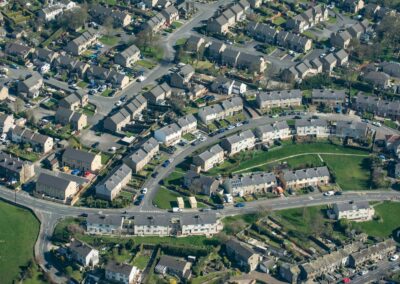Addressing the Ethical Challenges of Smart City Development
The Rise of Smart Cities in the Middle East
The rapid development of smart city technologies has brought numerous benefits, particularly in regions like Saudi Arabia and the UAE. Cities such as Riyadh and Dubai are at the forefront of implementing advanced technologies to enhance urban living. These smart cities leverage artificial intelligence, the Internet of Things (IoT), and big data analytics to improve infrastructure, optimize resource management, and provide better services to citizens. However, the integration of these technologies also raises significant ethical considerations related to surveillance and data governance.
Smart city technologies rely heavily on data collection and analysis to function effectively. In Riyadh, for example, sensors and cameras are deployed throughout the city to monitor traffic flow, manage energy consumption, and ensure public safety. While these technologies offer clear advantages, they also pose potential risks to privacy and civil liberties. The continuous monitoring and data collection required for smart city operations can lead to concerns about how this data is used, who has access to it, and how it is protected.
In Dubai, similar advancements are being made, with the city aiming to become one of the smartest cities in the world. However, the ethical challenges associated with such initiatives are not unique to any one location. As smart city technologies become more widespread, it is crucial to address these ethical considerations to ensure that innovation does not come at the expense of individual rights and freedoms. Business executives, mid-level managers, and entrepreneurs involved in smart city projects must prioritize ethical frameworks to guide their implementations and foster public trust.
Surveillance and Privacy in Smart Cities
One of the most pressing ethical issues in smart city development is the potential for increased surveillance. The extensive use of cameras, sensors, and other monitoring devices can lead to a surveillance state, where citizens are constantly observed. This level of surveillance can have a chilling effect on personal freedoms and raise concerns about the misuse of data. In cities like Riyadh and Dubai, where smart city initiatives are rapidly advancing, striking a balance between security and privacy is essential.
Surveillance technologies can undoubtedly enhance public safety and improve emergency response times. For instance, AI-driven surveillance systems can detect unusual activities and alert authorities in real-time, potentially preventing crimes and ensuring quicker interventions. However, the ethical implications of constant surveillance must be carefully considered. Questions about who controls the surveillance data, how long it is stored, and for what purposes it is used are critical in maintaining a fair and just society.
Data governance plays a vital role in addressing these concerns. Establishing clear policies and regulations on data collection, storage, and usage is necessary to protect citizens’ privacy. In the UAE, efforts are being made to develop robust data governance frameworks that ensure transparency and accountability. These frameworks should include provisions for data minimization, ensuring that only the necessary data is collected, and implementing strict access controls to prevent unauthorized use. By adopting such measures, smart cities can harness the benefits of surveillance technologies while safeguarding individual rights.
Data Governance and Ethical Frameworks
Effective data governance is crucial for managing the ethical challenges associated with smart city technologies. It involves creating policies and practices that ensure data is collected, processed, and stored responsibly. In the context of smart cities, data governance must address issues such as data ownership, consent, and accountability. Business leaders and policymakers in Saudi Arabia and the UAE must work together to develop comprehensive data governance strategies that align with ethical principles.
One approach to improving data governance is to implement data anonymization techniques. By anonymizing personal data, smart cities can reduce the risk of privacy breaches and misuse of information. Additionally, transparency is key to building public trust. Citizens should be informed about what data is being collected, how it is used, and who has access to it. Providing clear and accessible privacy policies can help achieve this transparency and empower citizens to make informed decisions about their data.
Ethical frameworks for smart city technologies should also include mechanisms for accountability and redress. In cases where data misuse or breaches occur, there must be clear procedures for addressing these issues and holding responsible parties accountable. This can involve regulatory oversight, independent audits, and the establishment of data protection authorities. By incorporating these elements into their data governance strategies, cities like Riyadh and Dubai can create ethical smart city ecosystems that prioritize the well-being and rights of their citizens.
Conclusion: Navigating the Ethical Landscape of Smart Cities
The development of smart city technologies presents exciting opportunities for enhancing urban living, particularly in forward-thinking regions like Saudi Arabia and the UAE. However, it also brings significant ethical challenges that must be addressed to ensure that technological innovation does not compromise individual rights and freedoms. By prioritizing ethical considerations related to surveillance and data governance, business executives, policymakers, and entrepreneurs can create smart cities that are not only efficient and secure but also fair and just.
As smart cities continue to evolve, ongoing dialogue and collaboration between stakeholders will be essential. Establishing robust ethical frameworks, transparent data governance practices, and accountability mechanisms will help navigate the complex ethical landscape of smart city development. Ultimately, the goal is to create smart cities that harness the power of technology to improve the quality of life for all citizens while upholding fundamental ethical principles.
—
#SmartCityTechnologies #EthicalConsiderations #Surveillance #DataGovernance #AIInSmartCities #SaudiArabiaSmartCities #UAESmartCities #RiyadhTechnology #DubaiTechnology #ModernTechnology #ExecutiveCoaching #BusinessSuccess #LeadershipSkills #ProjectManagement #GenerativeAI































